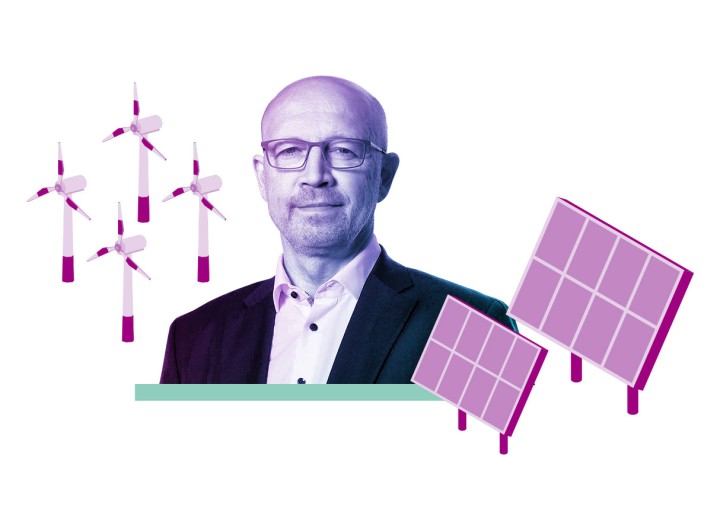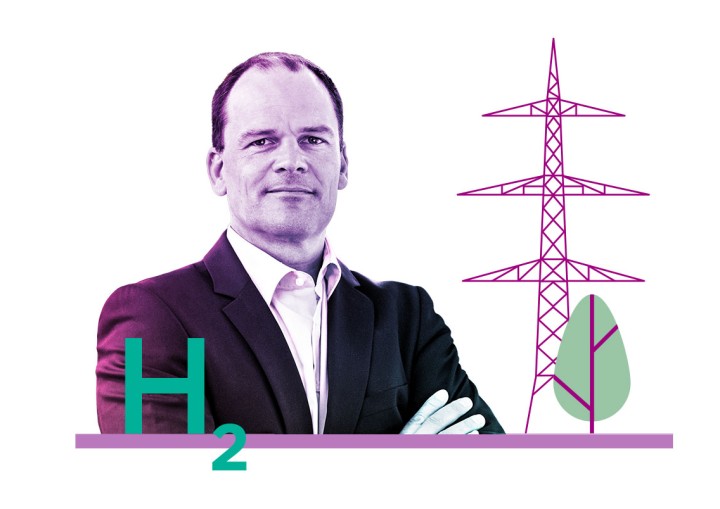Between energy security and climate protection

The repercussions of the war in Ukraine posed enormous challenges for the energy sector in 2022. We spoke to Andreas Kuhlmann, Chief Executive of the German Energy Agency (dena), and Dr Hendrik Neumann, Chief Technical Officer (CTO) at Amprion, about their joint supply security and climate protection efforts.
What is your personal verdict following a year dominated by crises?
ANDREAS KUHLMANN The year 2022 showed us how fragile peace, security and prosperity can be. Yet there were also some encouraging signals: we realised just what Germany is capable of achieving if it has to.
DR HENDRIK NEUMANN Especially where the energy crisis is concerned, we proved that we can act together fast in the short term. Looking back at the last winter, we were all very apprehensive in view of the exceptional situation. But we did our homework and refined our processes, so that system security was never seriously jeopardised.
Is the energy crisis an inhibitor or a catalyst on the path to energy transition?
AK Whether the crisis turns out to be a permanent catalyst remains to be seen. Much will depend on whether the pace we’ve set so far becomes the norm. That’s all the more important when it comes to decarbonisation, which entails radical changes.
HN From my point of view, the crisis was a trigger to mobilise energies and take bold action. The introduction of fast-track approval procedures is a good case in point here. Ultranet, for example – our connection between North Rhine-Westphalia and Baden-Württemberg – can be commissioned a year earlier than planned.
AK To my mind, irrespective of the last twelve months, Germany remains one of the most exciting energy transition labs in the world. We have so many players here – and so many innovative approaches and concepts – that can serve as a global model. We need to give more space to the ideas that form. We Germans still tend to get very much lost in details.
Whether the crisis turns out to be a permanent catalyst remains to be seen. Much will depend on whether the pace we’ve set so far becomes the norm.

To ensure security of supply in Germany, more electricity had to be generated using coal in 2022. Does this mean that energy security and climate protection are irreconcilable?
HN No, definitely not. Measures like the return of coal-fired power plants to the market were necessary for system security during the winter. That doesn’t mean climate protection targets have changed, though. Germany wants to phase out coal by 2030 at the latest. Amprion’s 10-point plan sets out what’s needed to get there – not simply technology-wise but also in terms of regulatory requirements.
AK The decision to focus on energy security was taken under pressure to defuse the crisis. It’s now time to subject the choices made to careful scrutiny, also with a view to climate protection. Was everything we did during the crisis absolutely essential? What measures can we scale back again? And how can the switch to renewable energy sources succeed in the long term?
HN The transformation to a climate-neutral energy system is the ultimate common goal. If we’re going to complete it successfully, we need to change the market design, amongst other things. We demonstrated what this could look like in practice with our concept for Amprion’s “Systemmarkt”. It’s vital that we come up with an adequate replacement for conventional power plants – and reconcile energy security with climate protection.
What could be Europe's contribution to energy security?
AK One of Europe’s core tasks is to provide sufficient secured power and suitable infrastructure as renewable energies become increasingly integrated. However, European coordination is a must not only for electricity but also for gases such as hydrogen or its derivatives.
HN The European interconnected grid is the backbone of energy security. But there are risks here too, of course. The non-availability of French nuclear power plants last winter is a prime example. That’s why it’s imperative that we always keep these risks in mind. Our dedicated analysis for the winter and the subsequent monitoring programme are only two of the steps we took to ensure this.
AK The pathway to a European energy system is further complicated by the umpteen regulatory hurdles. Although these are gradually being removed now, if you start off slowly, there’s more speed needing to be picked up along the way.
Let's turn our attention to Germany again. What exactly does the transformation of the energy system involve?
HN The energy system is undergoing a profound transformation. This has to do with the integration of renewable energies: electricity will have to be transported over ever longer distances. Just think of the 70 GW of offshore wind energy in 2045. The feed-in is highly volatile, which is why we need maximum flexibility in the energy system.
AK Decentralised power generation in particular requires better interaction between individual players. For example, that means not only transmission grids but also distribution grids have to be rapidly expanded. This is the only way that the energy transition will actually engage citizens – for instance, when it comes to connecting the growing number of photovoltaic systems, heat pumps and electric cars.
HN As a transmission system operator, we too have to take account of these changes because they make our business more complex. We work closely with our partners in the distribution grids for this reason, although that doesn’t alter our mandate to guarantee the stability of the overall system.
It’s been a challenging year but we were able, yet again, to justify our role as ‘trusted adviser’ to the federal government. The candid, constructive dialogue was genuinely enriching – and that’s what makes me so optimistic.

What makes you so optimistic that the energy transition will succeed?
HN I’d especially like to emphasise the good cooperation between all stakeholders. It’s been a challenging year but we were able, yet again, to justify our role as “trusted adviser” to the federal government. The candid, constructive dialogue was genuinely enriching – and that’s what makes me so optimistic.
AK I can confirm the new political momentum. I can also see an extensive network of start-ups and young people addressing these issues with incredible commitment. And more and more of them are making the design element the status quo. It’s an extremely welcome development.
HN I can see and feel this will to shape things every single day at Amprion. We have a dedicated and highly motivated team who are keen to play a part in the transformation of the energy system with innovative measures and actions.